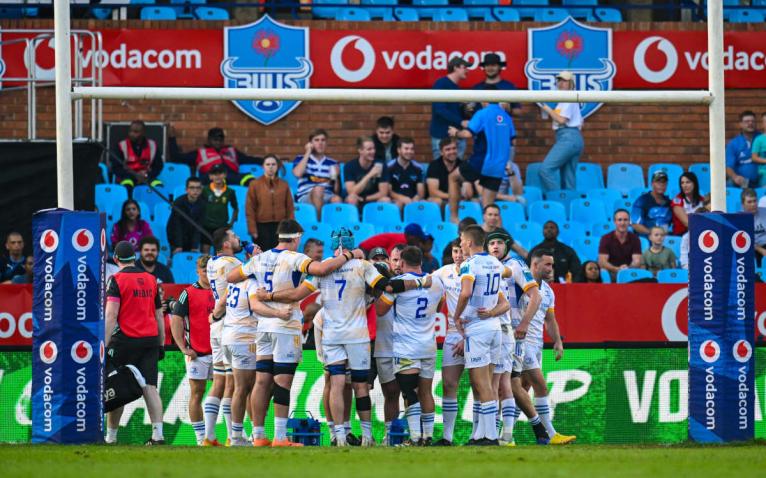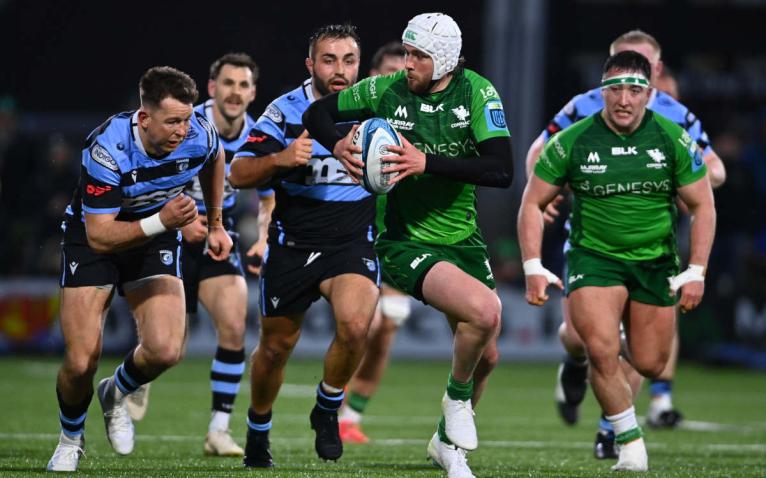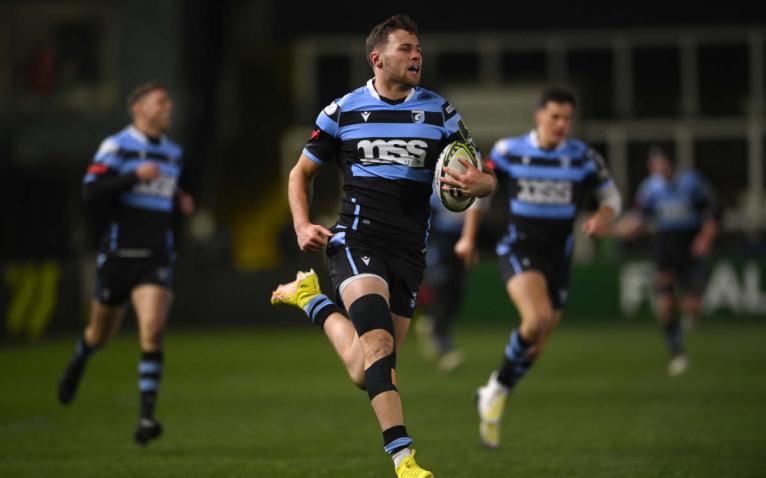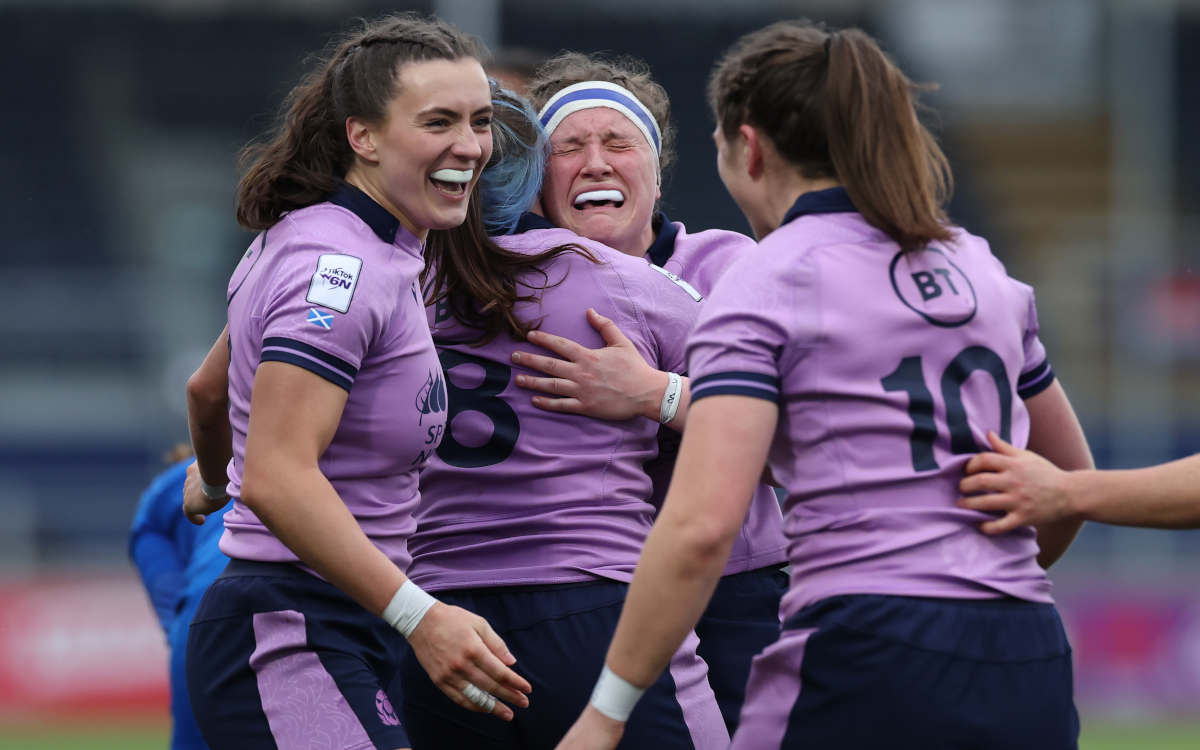The Premiership play-offs has been settled a week early, with Northampton Saints booking their place after Saracens dismantled London Irish’s valiant attempts at breaking up last season’s top four. Mark McCall’s side look well-placed to reach Twickenham, where they will be eyeing a return with last season’s winners, Leicester, or Sale Sharks, who haven’t reached a final since 2006. With the league losing two sides, in Wasps and Worcester Warriors, it has been a tumultuous season and organisers will hope the season can end on a high, as it looks to reset.
Here’s what RugbyPass+ picked up from the weekend’s games…
Saracens have a score to settle
Lost amidst the chaos of Freddie Burns nailing the late, late drop-goal that gave Leicester Tigers their beloved Premiership trophy back was a glut of Saracens players sat on their haunches, gasping for air and looking skywards, as if trying to make sense of losing a final they had been expected to win. With the motivation of proving to the rest of the Premiership that they still had what takes to lift silverware – after spending a year in the Championship – Borthwick’s men had stolen the script from Mark McCall and his North Londoner’s in a cruel fashion.
Now those who know Saracens well enough, will know they are not a side to forget disappointment in a hurry. They will have bottled that hurt and promised that in 12-months time they would not be feeling the same level of hurt again.
On Sunday, another part of the jigsaw to redemption was completed. Winning the Premiership in ‘regular’ time with a comfortable 45-21 win over play-off chasing hopefuls, London Irish. McCall’s men have posted 15 victories from 19 games, scoring nearly 600 points in the process. In short, they are well ahead of the chasing pack. Admittedly their replacements bench is no longer loaded with world-class talent, but their first XV can still go toe-to-toe with all but the most titanic of European foes and in Owen Farrell, they boast one of Europe’s most talismanic talents.
Farrell was in his element against London Irish. Despite trailing early on, he maintained his standards, pushed the team forward and tackled with relish. Slowly, he swung the pendulum towards Sarries, and with 20 points from the boot, kept the scoreboard ticking over. With Billy Vunipola a vocal supporter from the sidelines, the old guard, which comprised Alex Goode, Mako Vunipola, Sean Maitland and Jackson Wray, were backed up by the next generation of leaders, in Maro Itoje, Nick Tompkins, Ben Earl and Nick Isiekwe into setting standards expected in NW4. Indeed, the hugely promising Theo Dan was ticked off by Vunipola for an on-field indiscretion, after an eye-catching outing. The message was clear, it’s business as usual and the production line is in fine order. By the time Eroni Mawi bundled over from a short distance with a brace of tries, Irish’s resolve had been broken, and Saracens were plotting for a date with Northampton Saints in early May.
Even without the might of Theo McParland or Vunipola Jnr, they are still strong favourites to make a return trip to Twickenham later in the month and whomever their opponents are would do well to remember that Freddie Burns swing of the right boot because it made their task infinitely more difficult. Saracens look like they mean business and are on a mission of vengeance.
Double trouble – the pitfalls facing Leinster
Anyone looking at the URC table would draw a simple conclusion. That the table toppers, who finished 11 points clear of the pack, whose only defeat came when they dumped their second XV in South Africa, would canter home.
Well, think again. This weekend Leinster host Toulouse in the Champions Cup semi-finals. Win that, and their schedule could entail five knock-out games in successive weeks, Toulouse first this Saturday, followed by the visit of South Africa’s Sharks a week later. Victory there would send them to a URC semi-final against either Munster or Glasgow.
Following that, it’s the Champions Cup final weekend; and seven days later, the URC decider.
The possibility of a slip-up is real, considering the psychological and physical demands of this kind of schedule. The same 23 won’t be asked, or indeed, be capable of going week after week at this level. And while Leinster have the squad to cope, a reality remains that their various opponents have to be lucky just once over the next five weekends.

We could go back to Joe Schmidt’s time, when back-to-back Pro12 finals were lost a week after the Champions Cup was won, both in 2011 and 2012. Only once have Leinster completed the double, in their golden year of 2017/18, but that was before the South African quartet entered, when the competition was thin.
It isn’t now. A run-in including Toulouse, Sharks, possibly old rivals Munster or Ulster, La Rochelle/Exeter, and the potential of a URC decider against the reigning champions, the Stormers, is full of danger.
Will Glasgow count the cost of Connacht collisions?
Glasgow won, again, on Saturday night. Their seventeenth game unbeaten at Scotstoun. The first time they have gone an entire URC campaign without losing at home.
They looked in good shape against Connacht, forcing the in-form province to make three times more tackles, weaving the kind of deadly attacking shapes that have become a hallmark of the Franco Smith era, if lacking the killer touch to finish a few of them. Though the endgame was nervy, the 29-27 win sends them into a monumental season finale with another victory chalked up.
The story of the night was not the excellence of Glasgow’s attack or the skill of Connacht’s defence, but the remarkable toll of the game. Glasgow had Fraser Brown and Lucio Sordoni invalided out of the front-row. Jamie Dobie, Huw Jones and Cole Forbes followed them off for treatment.
Glasgow finished the game with a scrum-half, George Horne, on one wing (having replaced Dobie, a makeshift scrum-half starting on the wing), and a centre, Stafford McDowall, on the other, a fly-half, Tom Jordan, at full-back, and a back-row, Matt Fagerson, at centre.
Smith has carefully choreographed his selections with knockout rugby in mind. There is a balance to strike between managing player load and keeping them tuned up for battle. Kyle Steyn and Sione Tuipulotu, for instance, were rested on Saturday. Each will feature this weekend, when Glasgow travel to Scarlets for a tantalising Challenge Cup semi-final.
With fourth place already secured, though, and a spate of back-three men already absent, you wonder whether Smith will come to regret playing quite so many front-liners.
Connacht wronged – before a ball is kicked
Instead, they’re waiting. Due to a ridiculous ruling, Cardiff – who finished tenth – six points adrift of Connacht, are guaranteed a place in next season’s Champions Cup despite availing of an easier fixture schedule whereby they doubled up against their Welsh rivals, facing Ireland’s provinces just once.

None of the other 12 teams in the league had to deal with this inconvenience, adding credibility to Connacht’s finishing position.
So to still not be guaranteed a Champions Cup spot – which may go to the Sharks if they win the URC (unlikely) or to either 14th placed Scarlets, 11th placed Benetton if one of those sides wins the Challenge Cup – is wrong. And the only way to right that wrong is to change the qualification criteria ahead of next season.
The Welsh rebuild starts now
Where to start? Surmising Wales’ regions fortunes over the last eight months is no easy task. It has been a roller-coaster campaign, with lashings of drama and precious little stability as the sides settled on 11th, 13th, 14th and 15th positions in the URC table. As expected, there was to be no cigar to accompany Cardiff’s lifting of the Welsh shield, in what is a token piece of silverware in real terms, when the true business end of the season is only just starting. If Judgement Day was true to its name, a debatable 41,000 crowd, would be given a modest mark for enthusiasm in a forgettable occasion.
Of course, each region can point to areas of improvement, with Cardiff and the Dragons improving their points totals in the league and the Ospreys and Scarlets registering notable wins over Leicester, Montpellier and Clermont Auvergne, to show they can still topple better-resourced outfits, but there is scant optimism for further gains next season with the budgetary cuts which are seeing a steady stream of players announcing their departures from Welsh rugby.

Already 15 players from the Scarlets have said their final farewells, including Welsh internationals, Leigh Halfpenny and Rhys Patchell, while the Dragons have lost Ross Moriarty and Will Rowlands, with Sam Davies set to follow. The Ospreys will be without Gareth Anscombe and Dan Lydiate, who have announced they will be seeking new clubs, with Rhys Webb expected to follow. There are a glut of players at Cardiff set to leave the club, following Josh Navidi, who has retired, meaning more pressure on the Academy graduates next season in smaller squads. It will be a tough ask.
You have to wonder what the ambition of Welsh rugby is. Has it settled for being a feeder to the richer English, French and Japanese leagues, or does it still feel it can compete in a domestic competition? With reports that Wales may longer have a representative at Europe’s top table, the Heineken Cup, from the 2024-25 season, you have to wonder whether there is an acceptance that Wales is no longer a top-tier professional rugby nation.
While the players, who still have jobs, can put their feet up ahead of pre-season, you would hope there is no rest for the administrative rebuilding of the Welsh game, which will put the game on a surer footing? With a Challenge Cup final at Parc Y Scarlets and a provisional World Cup squad to be named next week, Welsh rugby is still has some dying embers to keep the flame alive, but largely, it has been a season to forget.
Scotland savour long-awaited triumph
The recent history of Scotland’s women’s team has read like a Greek tragedy, lurching from heartbreak to hard-luck story. Between the World Cup and the Six Nations, this team have endured a litany of head-frying near misses. They have experienced sporting anguish and devastation by the bucketload.
Results, and the frequently dramatic nature of them, have masked the fine progress the squad has made under Bryan Easson, the growth of their options and the new faces emerging and impressing on the international scene. They beat an Italian side of some pedigree without senior locks Emma Wassell and Sarah Bonar, flying winger Rhona Lloyd, and younger talents Emma Orr and Shona Campbell. There were big performances by Fran McGhie, who has come of age as a Test player, and Evie Gallagher.

Scotland, at last, can rid themselves of the gallant losers tag. We can ditch the horrible footnote of, ‘they played well, but…’. A run of twelve straight losses dynamited at the DAM Health Stadium. Next up, Ireland, back in Edinburgh, a decidedly winnable fixture.
This day was richly deserved, brutally hard-won, and raucously celebrated. So it should be.




In the eyes of a lot of fans, redemption for Saracens will only come when their squad has completely changed from the one that is implicated in their breaches of the salary cap.
They were initially penalised for a handful of proven breaches - but were relegated because they refused to open their books to further inspection. Accepting automatic relegation rather than risk exposing more breaches gives a sense of how bad it must have been.
It was an open secret among Premiership coaches and club leadership that they were cheating. I heard it directly from one coach as early as 2013, and Paul Gustard joked openly to Quins fans that a key difference in recruitment was that at Saracens “the budget was unlimited.” But Nigel Wray’s legal team successfully stymied one investigation and changed the salary cap to a more flexible salary framework several years before the evidence became inescapable.
How many trophies did they win in that time? How many international caps did they have on their bench? How many of those players are still playing for Saracens, presumably not entirely out of the goodness of their hearts?
When they returned to the Premiership they regathered most of their loaned players, and they’ve had some of the lowest turnover in their squad from season to season.
One could be forgiven for suspecting that, somehow, something special is still happening at Saracens. It’s hard to have confidence that all is above board when the squad remains so achingly familiar.
This was a balanced article, but it certainly doesn’t help other clubs’ fans forgive them that many in the media still fawn over them.
Very impressive mental acrobatics are required to spin the situation at Saracens as a story of redemption.
Leinster’s schedule will be excellent practice for the RWC when they may have to go RSA, Scotland QF SF and Final
I doubt that Sarries are anywhere near redeemed in the eyes of the other English clubs!
Don’t know ‘Quins seem to be doing ok